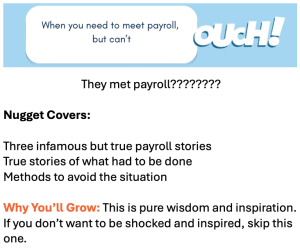Where You Want To Be
$23.00
Top Tier Business Growth Lessons.
Unbelievable case studies that will inspire you to the next level. Proof that if you know you are on to something, there is always a way and a wayward helper at the ready for you. Meant to be motivational, this nugget shares three principles that have anchored some of the fastest growing companies in history.
You and your company are either currently in a storm, coming out of a storm, or about to enter a storm. That’s life. That’s entropy. This nugget is for those that understand that.

Top Tier Business Growth Lessons.
Unbelievable case studies that will inspire you to the next level. Proof that if you know you are on to something, there is always a way and a wayward helper at the ready for you. Meant to be motivational, this nugget shares three principles that have anchored some of the fastest growing companies in history.
You and your company are either currently in a storm, coming out of a storm, or about to enter a storm. That’s life. That’s entropy. This nugget is for those that understand that.
(0:00 – 0:37)
I said, anybody got any good payroll stories of not meeting payroll? I brought this up because telling you guys about how Brian Smith has his mantra card and how that led to a company raising a million dollars the day after his talk. I really wanted to pick back up on that cause I had some studs at the table. So we went around the table and I want to, I want to throw out a story from Jeff Hoffman and then I’m going to add a story from, Fred Smith’s autobiography, that Fred Smith is the founder of FedEx.
(0:38 – 0:45)
So I’m going to go right to Jeff. I said, anybody got any good payroll stories? He goes, Oh, I got one. There’s no, no question.
(0:45 – 0:56)
I got a good one. He goes, and in one of the early days of our company, I can’t remember if this is ColorJar, his current company. I can’t remember if this is the kiosk or Priceline.
(0:56 – 1:14)
I don’t remember, but he has started so many huge companies. But he says in the early days we were struggling, you know, we didn’t have funding, you know, didn’t have any ability to pay people really, you know, a solid salary. It was just a bunch of great people getting together.
(1:14 – 1:39)
I remember one day I had gone by the lunchroom and I saw all of the guys playing poker, even a couple of the ladies playing poker, every Friday at lunch break. It would kind of bother me because they knew I was struggling to meet payroll. Yet here they are just throwing tens and twenties around playing poker.
(1:39 – 1:56)
Yet all they would do is grumble during the week under their breath. Finally, after about six to eight weeks of, of me going to lunch, looking through the window and they’d catch me seeing, you know, locking eyeballs and they’d all look down and, you know, pretend I didn’t see him playing poker. Finally, my feelings were so hurt.
(1:57 – 2:11)
I walked into the lunchroom and everybody quickly grabbed all the money in front of them and, and kind of pushed it aside. They put a notebook over like the pot in the middle. I said, ‘Guys, come on, you, you’ve got to know that.’
(2:11 – 2:22)
I know you guys play poker every Friday and nobody said anything. Nobody even looked at Jeff. They were so saddened that they were caught playing poker.
(2:22 – 2:47)
He goes, Jeff goes, you know, all I want to know is if you guys know you really can’t afford to be going to the movies and taking your wife’s out to dinner and this and that, how do you have enough money to play poker? Finally the leader of the group looked up and he said, ‘Jeff, we’re not playing poker.’ He goes, ‘You might want to pull up a seat.’ And so Jeff pulled up a seat.
(2:47 – 2:56)
He goes, ‘What do you mean you’re not playing poker? I see the money right there. It’s, I see quarters, I see pennies, I see dollars.’ And he goes, ‘Jeff, no, every Friday is payroll day.’
(2:56 – 3:13)
As we all know, there’s not quite enough money for, for everybody’s payroll. So what we all do on Fridays is we empty our wallets and our purses in the middle of the table and we go around the table. So we start over with Mary and we say, ‘Mary, what do you have to have this week?’ And she says, ‘Well, honestly, I need $18.’
(3:14 – 3:26)
‘I’ve got to pay my babysitter. If I don’t pay her, she’s never going to babysit again.’ So Mary would take out $18 and then we would go to Bob and Bob would say, ‘You know what, honestly, guys, I need 60 bucks or they’re going to turn off my cable.’
(3:26 – 4:01)
‘And if I don’t have cable, I can’t work from home.’ So Jeff would take $60 and then it would go to this person. If they don’t pay their mom back, $45, you know, and, you know, most of the time we can go all the way around the table and Jeff goes, ‘All I could do is I felt so sad that we weren’t strong enough and big enough and fast enough of a growing company for me to pay a proper payroll, but I can tell you me watching that and them seeing my face forged us as a team like nothing else could do.’


